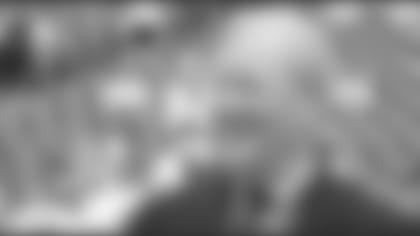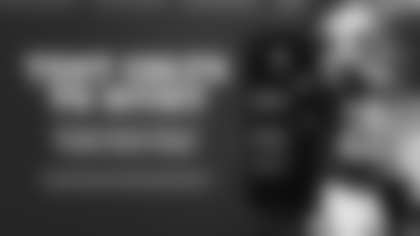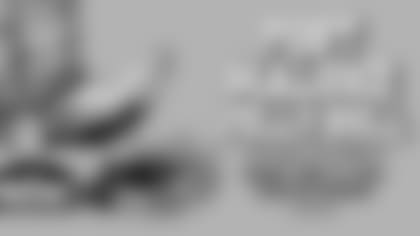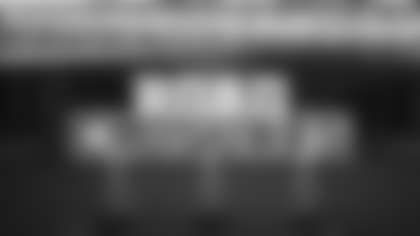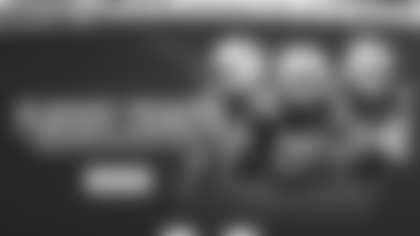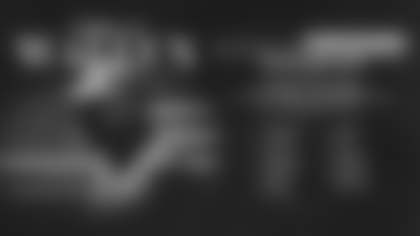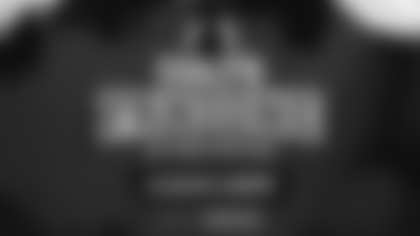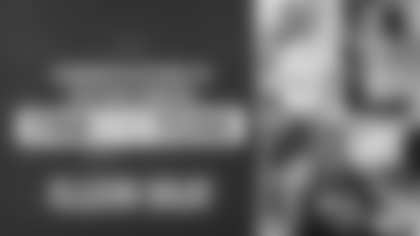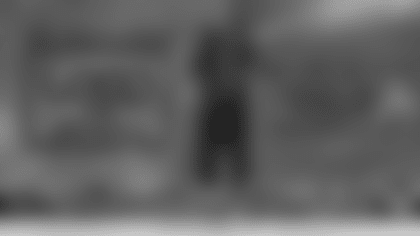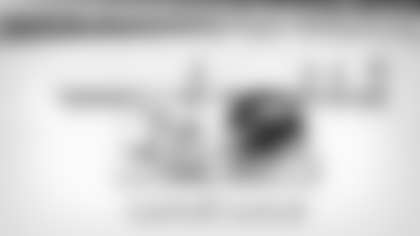The Polian Corner, Week 16, Colts at Raiders
Bill Polian, in his 13th season as Colts president, has a resume unique in the NFL. The only man to win NFL Executive of the Year six times, Polian in the 1980s built the Buffalo Bills into a four-time Super Bowl participant. In the mid-1990s, he built the expansion Carolina Panthers into a team that made the NFC Championship Game in its second season, 1996. Since joining Indianapolis in 1998, he built the Colts from a 3-13 team in 1997 and 1998 into one that has made the playoffs 10 of the last 11 seasons, including AFC Championship Game appearances after the 2003, 2006 and 2009 seasons, AFC South titles in 2003, 2004, 2005, 2006, 2007 and 2009, Super Bowl appearances following the 2006 and 2009 seasons and a Super Bowl championship following the 2006 season. Each week during the season, in The Polian Corner, Polian and Colts.com will discuss issues pertinent to the Colts and the rest of the NFL.
Q: A 34-24 victory over the Jacksonville Jaguars Sunday. What did you see reviewing the tape?A: You always see things you didn't anticipate when you look at the tape both positively and negatively, but the thing that stood out beyond a shadow of a doubt was how our defense flew around. We haven't played that way in quite some time, and it was fun to watch. When our guys are on the move, as they were Sunday, they're hard to block. They're hard for bigger teams to adjust to. I thought we just did a phenomenal job of doing the things that got us to be a good defensive team. The play of (defensive end) Dwight Freeney was out of this world. He was better than he has been all season, and this has been a good season for him. He just took the game over, really, in a lot of situations. (Defensive end) Robert Mathis was, as usual, tremendous. (Defensive tackle) Fili Moala was tremendous. (Defensive tackle) Danny Muir had a good game. (Linebacker) Pat Angerer had a terrific game. (Middle linebacker) Gary Brackett was great. (Rookie) Kavell Conner was terrific. He really packs a wallop, too. Kavell's not playing nearly as fast as he will a year from now when he's used to being in the system and used to the speed of the National Football League, but there were a couple of plays where he just stopped people cold in their tracks, and he wasn't even flying 100 miles per hour. He was going about 85. The sky's the limit for him, and I thought our secondary did a terrific job as undermanned as they were. (Safety) Antoine Bethea was Antoine Bethea. He plays well every week, but he really rose to the occasion Sunday. He played well at the line of scrimmage. He tackled great. He did everything you could ask a safety to do, including turning the ball over. Defensively, you couldn't ask for a better ballgame. Special teams-wise, we did a really good job on kickoff coverage. We did a poor job on the one punt, unfortunately, but that's a combination of inexperience and having fellows in there who really weren't with us in training camp. A lot has been made of all of the special teams miscues Sunday (around the NFL), ours, which has been downplayed to a large degree, the Giants, which has been ballyhooed until the cows come home, and, of course, New England's Sunday night. It amounted to a complete game-changer. What people miss and what (Packers Head Coach) Mike McCarthy to his great credit said after the ballgame (against the Patriots) is that many of the players – in fact, probably the majority of the players – playing special teams at this stage of the season for teams like Green Bay and ourselves that are decimated by injuries were not even in training camp. They haven't had any training camp. They don't know how to respond to those situations. They're being taught on the fly. It's very, very difficult if you're a special teams coach to bring in a fellow one week and have him playing the next. You're going to get errors, and that's what's occurring. You get people bunching up in the wrong lanes. You get three guys in one lane and even a lineman can outrun them there. In both the Giants' case and in our case, the balls were punted exceedingly high, and so everybody got down there at the same time. Once you broke the front wall – which is always the case whenever there's a muffed punt -- all bets are off. More than likely, if the returner gets his hands on it, it's likely to come back. That's the hidden issue with special teams coverage. That said, in our case, play through the whistle. Don't worry about whether he made a fair catch signal or not. That's not your concern. You have to play through the whistle and let the referee determine what occurs. Don't hit him, obviously, but play right through the whistle. Get right up there cheek-to-cheek and make sure he catches the ball and make sure you're going 100 miles an hour. That wasn't the case. We relaxed and got a little lax in our lanes and he (Jaguars wide receiver Mike Thomas) broke one. They have two great return men. It was a shame because our defense held them to 17 (points). That is your goal every week. If you hold a team to 17, you should win. In addition to that, the rest of our special teams did a heck of a job.
Q: And Colts defensive back Al Afalava, the last line of defense, appeared to get injured on the play . . .
A: Al got knocked down and hurt with an ankle sprain. He was not in a position where he could make a play, but we didn't handle it well. That's on us. Don't worry about whether or not he made a fair-catch signal. You just keep going until the referee tells you to stop.
Q: In a must-win situation, there was an awful lot of resiliency Sunday . . .
A: The offense, until (wide receiver) Austin (Collie) went out, was functioning as well as it has functioned all season long. We got a bit more pedestrian once Austin was out of the ballgame because of the injury configuration at tight end. We had Jake Tamme and now they were coming in with three linebackers instead of the nickel package, and that made it much more difficult to run. We bogged down a little bit, but the bottom line was every platoon functioned pretty well throughout. The game was never out of the woods, which it might have been had Austin not gotten hurt, but we stayed with it and made the plays necessary to win. This is a team that Sunday, once Austin went out of the ballgame, was minus nine starters and two high-quality backups – 11 players. I believe we entered the San Diego game with 11 starters out. That's unheard of. The bottom line is it's awfully difficult to stretch the rubber band as far as it has been stretched with us and ask guys to perform as well as they have performed. They have. They haven't backed off an inch. They just keep coming. They keep working. They keep playing hard week in and week out. They're a very, very easy group to root for. They make you proud.
Q: On the pass route on which Austin Collie was injured, that seemed like the same route on which he was injured against Philadelphia. And wasn't Dallas Clark once injured on a similar pattern? Would it not be a good idea to tweak or eliminate that play?
A: There are similarities. They're not all the same routes that you're talking about. In the Philadelphia game, Austin actually had caught the ball and was running up the field and got caught up between the two safeties. On Sunday, he was the classic example of the so-called 'defenseless player.' He had reached out for the ball, didn't have possession and the second foot hadn't hit the ground. There was a collision. In Dallas' case, he was not a defenseless player. His second foot had hit the ground. That was a different route. That was a route that was up the hashmark rather than the seam. Austin's route was a seam route. These kinds of collisions occur most often against so-called Cover 2 (defense), where you have two-deep safeties, and very often when there is a linebacker underneath trying to take away the crossing route from that receiver who is running down the middle of the field. There are a lot of those that are thrown in the National Football League every game day and, relatively speaking, there are very few injuries that occur. There has been so much controversy and so much publicity over injuries that it does stick out in your mind. But if you're at practice every day, that's a route we throw very frequently with very little consequence. You're talking about actually two injuries – Dallas' and Austin's Sunday – which came from throwing the route. There wasn't a darned thing you could do about the issue in Philadelphia. Austin was a ball-carrier. Those things happen. We want to make the game safer. There is some portion of it that is never going to be 100 percent safe. That said, I think there is a long, long way we can go technologically with the helmet. I personally believe that therein may lie the answer. There are other things we can do – along with the wonderful steps the Commissioner (Roger Goodell) has taken to make sure the game is cleanly played and safely played – but I think the next logical steps would clearly involve the technology of the helmet. That's an area where I'm told by experts that we can make some progress.
Q: Any word on Austin?
A: At this point, we're certainly going to err on the side of caution. We did last time around. He missed a month. But we're going to err so far on the side of caution you won't be able to see the other side. We'll see how it goes.
Q: When (linebacker) Tyjuan Hagler recovered the onside kick and returned it for a touchdown to clinch the game, he touched the ball before it went 10 yards. Is that legal?
A: Yes. The receiving team can touch it at any point. It has to go 10 yards in order for the kicking team to touch it. Otherwise, it's an illegal touch, but the receiving team can touch it at anytime. He saw the lane and picked it up and went.
Q: Are players fined when they give a ball to someone in the stands?
A: It used to be that the player was unilaterally fined by the league, not the club. Most fines are levied by the league. The Collective Bargaining Agreement specifically states what clubs can fine for, and that's not an area the club would really have much to do with. The league had an automatic fine, and I don't know if they still enforce it our not. We have not had a situation where that occurred. They did make an exception in certain cases where the ball was given by a player to a handicapped person, to a youngster or in some cases a loved on – mother, daughter, etc. Most players give the touchdown balls to the equipment man and he puts it in the trunk for safekeeping. They have the ball marked up and it's part of their memorabilia collection. So, there is far less of it than there used to be. Frankly, it isn't a problem any longer, so I've not run across a fine for throwing the ball in the stands in a couple of years and that might be conservative – three or four years maybe. We haven't run across one that we've seen.
Q: What about the Lambeau Leap?
A: The Lambeau Leap is specifically exempted from the demonstration rule, which is very strictly enforced, and from the idea that you should not throw a ball in the stands. It's by statute exempted.
Q: Are we going to see a Saturday Night Live episode where Peyton Manning beans a Colts offensive lineman for a false start?
A: There are false starts, then there are false starts. Part of the difficulty in operating our offense is that Peyton stands at the line of scrimmage for a fair amount of time surveying the defense, and then barking out alerts. That's a long time for an offensive lineman to be in a stance. They're used to getting in a stance and firing out. It's a long time for them to be in the stance, and it's especially true when you're in a silent count situation. It takes a great deal of fortitude and discipline to stay in that stance and not put yourself in a position where you do have a false start. Every once in a while we're going to have one because of the nature of the offense. We don't like penalties, but that's one where we recognize that some of that sort of comes with the territory.
Q: Can you talk about your pre-game routine of shaking hands with every player?
A: That started a very long time ago, my first year here, because we were new. Everybody in the organization on the football side was new, and I wanted the players to know that everybody was in this together and we wished them well. It became a superstition, so it has been carried on seemingly forever. I'm not a big person for superstition, but there are other people who are, so we keep it up as much as we can.
Q: What does the future hold for safety Bob Sanders now?
A: For this year, he's on injured reserve, so he's out for the year. We took a gamble in terms of hoping he would get back from the injury, which was a similar injury to that which he had on the other arm last year. We hoped he would get back after a similar period of convalescence. It didn't work out that way. When we got to the 12-week period, the arm, according to Doctor (James) Andrews who did the surgery, had not progressed strength-wise where they thought it was good enough to put him back out on the field. That was a gamble we took that didn't work out well. That's just one of those things that happen. This is kind of a year where virtually every decision and everything you did from a medical standpoint came up snake eyes. As to the future, it would all depend on what the labor situation is, what kind of a system we have, what the transition rules are from the present system to a new one. That's just not Bob, that's virtually everyone on the team. As soon as a new system is put in place, I will be spending the vast majority of my time – that which I don't devote to personnel evaluation, both at the collegiate and pro levels – I will be spending almost every other waking hour working on a plan going forward for us to adapt to the new system, both with the present roster and what we may have going forward. It may change our player acquisition point of view. It may change the way we manage our budget. No one knows. I don't have an answer for Bob or anybody else until we find out what the new system is, what some of the transition rules are from the old system to the new. Those are a bit opaque at the moment and in Bob's case, that involves a tremendous amount of signing-bonus acceleration money. Those are questions that are yet to be answered.
Q: Any update on the CBA front?
A: The Commissioner said Sunday night he remains optimistic, and I agree with him. I tend to be an optimist, too. Obviously, at some point in time, it will end. There will be a deal. When that point in time is, I don't think anybody can say. Hopefully, it's more sooner than later.
Q: Can you comment on any of the calls against the Colts in recent weeks?
A: Let me just discuss the calls I can discuss. The leaping call (against Dallas) was a good call. The disconcerting signals call, I don't know what was called, so I can't comment on that. The fifth down (call against Jacksonville Sunday) I will explain, because Duke Carroll and Red Cashion, who were he supervisors at the game Sunday, were kind enough to explain it to (Vice President and General Manager) Chris (Polian) and I, and (referee) Mike Carey explained it to (Colts Head Coach) Jim Caldwell. That was a perfect example of what John Teerlinck, our great defensive line coach, calls, 'Good, good, bad.' You did two things well and one thing didn't work out quite as well.' When there is a false start, it is the responsibility of the referee to shut the play down. You could have injury situations, particularly the quarterbacks and to other players, that we do not want. It's the referee's job to shut the play down on a false start. Mike did that. You could not hear his whistle, and no one on the field heard his whistle because it was so loud. And let me add here, when we're passing out kudos, game ball to the fans. What a great job. Because they were so loud and so fired up, no one could hear anything. Mike shut the play down and so it was, 'No Play,' even though the result was we had stopped them and we were going to get the ball. A wing official came in and said to Mike that there was some reason to pick up the flag. I have no idea what that reason was and have not been told by the league office what it is. I'm sure we will be told and it's not within my purview to tell you even if I knew, but I don't know. What happened was Mike did exactly the right thing by shutting the play down. The wing official saw something that caused Mike to pick the flag up. We don't know what it was. Then, Mike correctly applied the rule and said, 'This is a situation where the play was in fact a dead-ball situation, so there is no play.' They got what looked like a fifth down when in reality it wasn't. They applied the rule and the mechanics correctly. Why the flag was picked up your guess is as good as mine. I don't know.
Q: What is your opinion on the Colts' post-season chances if they get in?
A: We have to win two more games to advance, so that's where our focus is. If we're fortunate enough to advance, hey, anybody can win on any given Sunday. There's no question about that. If you need any proof that the experts are almost never right, stop and think about in Week 1 who most everybody was crowning the new division champion. That's all you need to know about prognostication. As our friend Chris Berman (from ESPN) is wont to say, 'That's why they play the games.'
Q: Is running back Dominic Rhodes just one of those players who brings a little extra something to the team – a spark, mojo . . . something? He seems to have provided some of the heart that was maybe missing for a few weeks.
A: First of all, Dom has a special incandescence about him. Everybody's happy to see him. He's happy to be back. This is, as we sometimes joke, his ancestral home. He goes other places in fits and starts and always comes back here and always does well. He's a Colt, and he's the kind of guy that does bring a certain spark. I don't think we ever lost any heart. The perfect example of that are the sad endings to the New England and Dallas games where we were in a position, where we actually could have won the games and had some breakdowns and some situations that occurred because we had new players in the lineup, and we weren't reading things exactly as we should have. Everybody wasn't exactly on the same page. That's going to happen. It just does. It's a function of playing together and having a lot of continuity, and when you take Austin Collie and Dallas Clark and Joseph Addai out of the lineup you're taking out a pretty big chunk of your offense. When you're putting new players in there at running back almost on a weekly basis and at slot receiver almost on a weekly basis, you put yourself in a situation where those things can happen, and they did. But we fought hard in every single one of those games. We fought hard. So, we hadn't lost any heart. We lost the ability to efficiently execute in the clutch, and a lot of that has to do with who is out there. The tighter the situation, the more you tend to rely on those top guys. Coming down the stretch in Philadelphia, when we had the ball and needed a field goal to win the game, we didn't have Austin, we didn't have Joe, we didn't have Dallas. I daresay if we had one of the three – not three of the three, but one of the three – the result may have been different. Not to denigrate anybody who's out there. It's a function of playing together and knowing how to play in those situations. That's where those losses manifest themselves. Had we lost heart, were we not playing with heart, those games would never have been hanging in the balance with a minute or so left in each ballgame. We play with great heart. Defensively, we haven't played as efficiently as we should have. We haven't played as well as we did Sunday because we were on the move and flying, and Jim Caldwell made it a point to tell the defense, 'Hey, I want to play Colts defense. I want to play simple coverages, and I want to play the kind of front that we're used to playing and we're on the move and flying and we're a better football team when we do that.' But it had nothing to do with heart. It had really to do with execution and in lots of cases, the fact that when you're playing together, you don't have to think about things. You just do them. Because you've done them over and over and over again. When new people are in there, the efficiency – especially what I like to call, 'The Critical Efficiency,' when all the marbles are on the line – it's tough to do. Another example, which has nothing to do with our team, is you could not have found a team that played with more heart than the Green Bay Packers did Sunday night. They played 59 minutes and 30 seconds of great, great football. They had a special teams breakdown that changed the game and as we talked about, that will happen largely because of injuries. They are the other team that is as depleted as us, and I guess their record is the same. (Quarterback) Matt Flynn made his first start and played as well as anyone could have expected him to play. But when it came to operate the one-minute offense to win the game at the end of the game, he just had not been out there enough to do it efficiently: critical efficiency. A phenomenal performance comes up a bit short, but they didn't lack for heart, that's for darned sure. They didn't lack for a great defensive game plan by Dom Capers and a great offensive game plan by Mike McCarthy and more credit to Mike McCarthy for saying, 'We're nobody's underdog. We're not into moral victories. Let's get on with the job of winning next week.' They played with great heart and so have we.



